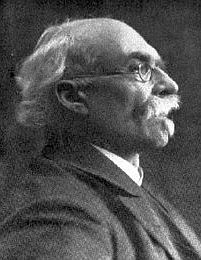Er zijn filosofische werken die bij publicatie met stilte en desinteresse worden onthaald, om later te worden geprezen om hun grootsheid.
En er zijn er die bijna onmiddellijk als belangrijk worden aangekondigd en hun generatie beïnvloeden, om later in de vergetelheid te raken.
De verhandeling over de menselijke natuur van David Hume, waarover de auteur bij publicatie in 1739 klaagde dat hij doodgeboren was, is een voorbeeld van de eerste categorie.
Hans Vaihinger’s werk, “Die Philosophie des Als Ob“, is een voorbeeld van het tweede. Het boekwerk werd voor het eerst gepubliceerd in 1911 en er waren meer dan tien edities van het werk tegen de tijd dat Vaihinger stierf in 1933.
Hans Vaihinger (1852–1933) werd geboren in de buurt van Tübingen in Duitsland. Hij leverde belangrijke bijdragen aan epistemologie, wetenschapsfilosofie en wiskunde, en aan de geschiedschrijving van de filosofie.

Hij was een belangrijke en fascinerende figuur in de Duitse filosofie in het begin van de twintigste eeuw en richtte het bekende tijdschrift Kant-Studien op. Toch werd hij overschaduwd door de ontluikende bewegingen van de fenomenologie en analytische filosofie, evenals door vijandigheid jegens zijn werk vanwege zijn verdediging van joodse geleerden in een door het nazisme gecontroleerd Duitsland.
Tegenwoordig wordt echter algemeen erkend dat zijn “Die Philosophie des Als Ob” een filosofisch meesterwerk is, gepubliceerd in 1911, hoewel de uiteenzetting van de basisprincipes meer dan dertig jaar eerder was geschreven.
Vaihinger betoogt dat we in een overweldigend complexe wereld een eenvoudigere reeks ideeën of idealiseringen produceren die ons helpen met de complexiteit om te gaan. Wanneer ze als ficties worden gezien, bieden dergelijke ideeën een gemakkelijkere en nuttiger manier om na te denken over bepaalde onderwerpen, van wiskunde en natuurkunde tot rechten en moraliteit, dan de waarheid in al zijn complexiteit.
We gaan ervan uit dat de wereld morgen zal bestaan, maar weten we het zeker?
Zelfs in de wetenschap, schreef hij, moeten we doorgaan ‘alsof’ er een materiële wereld bestaat, onafhankelijk van het waarnemen van subjecten; in gedrag moeten we handelen ‘alsof’ ethische zekerheid mogelijk is; in religie moeten we geloven ‘alsof’ er een God is.
In “Die Philosophie des Als Ob” betoogde Vaihinger dat mensen de onderliggende realiteit van de wereld nooit echt kunnen kennen, en dat we als gevolg daarvan denksystemen construeren en vervolgens aannemen dat deze overeenkomen met de werkelijkheid: we gedragen ons “alsof” de wereld overeenkomt met onze modellen.
Hij gebruikte met name voorbeelden uit de natuurwetenschappen, zoals protonen, elektronen en elektromagnetische golven. Geen van deze fenomenen is rechtstreeks waargenomen, maar de wetenschap doet alsof ze bestaan en gebruikt waarnemingen op basis van deze aannames om nieuwe en betere constructies te creëren.
Vaihinger erkende verschillende voorlopers, vooral Kant, maar was niet op de hoogte van Jeremy Benthams Theory of Fictions totdat het onder zijn aandacht werd gebracht door zijn vertaler, C.K. Ogden, aan het einde van zijn leven. In het voorwoord van de Engelse editie van zijn werk formuleerde Vaihinger zijn principe van fictionalisme1: “Een idee waarvan de theoretische onjuistheid wordt toegegeven, is om die reden niet waardeloos en nutteloos; want zo’n idee, ondanks de theoretische onjuistheid [,] kan van groot praktisch belang zijn.” Bovendien ontkende Vaihinger dat zijn filosofie een vorm van scepticisme2 was, omdat scepticisme een twijfel impliceert, terwijl in zijn ‘alsof’-filosofie de acceptatie van overduidelijk valse ficties gerechtvaardigd is, als een pragmatische, niet-rationele oplossing voor problemen die geen rationele antwoorden hebben.
Deze filosofie is echter breder dan alleen wetenschap. Je kunt er nooit zeker van zijn dat de wereld morgen nog zal bestaan, maar we gaan er meestal van uit dat dat zo is.
Alfred Adler, de grondlegger van Individual Psychology, werd sterk beïnvloed door Vaihinger’s theorie van bruikbare ficties, waarbij hij het idee van psychologische ficties opnam in zijn persoonlijkheidsconstructie van een fictief einddoel.
1 Fictionalisme is de opvatting in de filosofie volgens welke uitspraken die beschrijvingen van de wereld lijken te zijn, niet als zodanig moeten worden geïnterpreteerd, maar in plaats daarvan moeten worden opgevat als gevallen van “make believe”, van doen alsof iets letterlijk waar is (een “nuttige fictie”).
2 filosofisch scepticisme; uit het Grieks σκέψις skepsis, “onderzoek”, is een familie van filosofische opvattingen die de mogelijkheid van kennis in twijfel trekken. Filosofische sceptici worden vaak ingedeeld in twee algemene categorieën:
- degenen die elke mogelijkheid van kennis ontkennen, en
- degenen die pleiten voor opschorting van het oordeel vanwege de ontoereikendheid van bewijs.